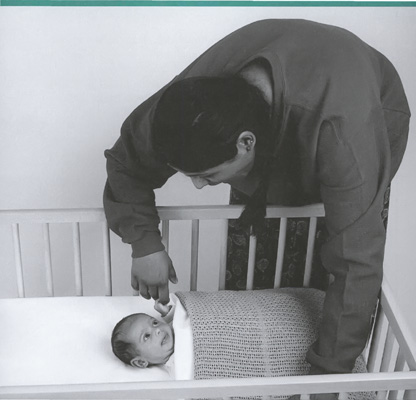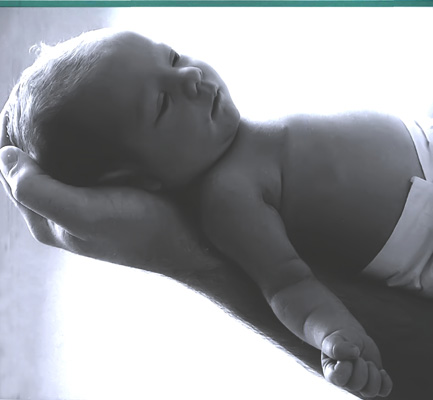
Полная версия:
Help Your Baby to Sleep


Help Your Baby to Sleep
Penney Hames

Copyright
Thorsons/National Childbirth Trust Publishing
Thorsons is an imprint of HarperCollinsPublishers Ltd. 1 London Bridge Street London SE1 9GF
www.harpercollins.co.uk
First published in collaboration with National Childbirth Trust Publishing 1998
© NCT Publishing 1998, 2002
Original photography: Anne Green-Armytage, © 2002 NCT Publishing Additional photography: Michael Bassett here and here.
Penney Hames asserts the moral right to be identified as the author of this work
A catalogue record of this book is available from the British Library
All rights reserved under International and Pan-American Copyright Conventions. By payment of the required fees, you have been granted the nonexclusive, nontransferable right to access and read the text of this ebook on-screen. No part of this text may be reproduced, transmitted, downloaded, decompiled, reverse engineered, or stored in or introduced into any information storage and retrieval system, in any form or by any means, whether electronic or mechanical, now known or hereinafter invented, without the express written permission of HarperCollins ebooks
HarperCollinsPublishers has made every reasonable effort to ensure that any picture content and written content in this ebook has been included or removed in accordance with the contractual and technological constraints in operation at the time of publication
Source ISBN: 9780722536087
Ebook Edition © AUGUST 2016 ISBN 9780007405008
Version: 2016-09-09
Dedication
For Richard. Beany and Richard (Junior), with love
Contents
Cover
Title Page
Copyright
Dedication
Introduction
1 What do we Know About Sleep?
2 But What do You Want?
3 What does your Baby need for a Good Night’s Sleep?
4 Where Should my Baby Sleep?
5 Feeding and Sleeping
6 Who Wakes at Night?
7 Crying and Sleeping
8 Practical Tips
9 Coping with Feelings, Gaining Support
10 Alternative Help
11 Behaviour Management
12 Sleeping at the Wrong Time
13 Beyond Babies
14 Afterthought
Resources
Further Reading
About the National Childbirth Trust
Index
Acknowledgements
About the Author
Other titles in this series
About the Publisher
Introduction
Sleepless babies are all too common. One small paragraph in New Generation, the Journal of the National Childbirth Trust, which asked for parents’ experiences for this book elicited dozens of replies. Then, talking to an astonishing array of professionals and researchers who have devised, through their widely differing disciplines, effective approaches or remedies for the sleeplessness of babies led me on to dozens more women. And women who had heard about the book on the grapevine of my local National Childbirth Trust branch, also called. Find me a parent and I’ll show you someone with an opinion about babies’ sleep.
The problem with any subject worth its salt is that right-minded, sensitive people can believe any number of threateningly different things. I believe that an author ought to listen to all these different opinions, try to see the value in each, and while rejecting none, chart a clear course for each reader, irrespective of how that reader prefers to travel.
So much for the theory. I’m sure that my own persuasions are written large in between the lines of this book. Nevertheless I hope that Help Your Baby to Sleep has accomplished three things: first, to acknowledge that no one approach is right for everybody; second, to accept that complex emotional ties may make the supposedly simple act of leaving your baby to sleep heart-wrenchingly difficult, and that is not simply something to overcome, but an awareness that may suggest a different approach; and third, to express the ambivalence and complexity of a vast range of attitudes, through the words of parents.
I hope you find in it something that speaks to you.
Penney Hames

1 What do we Know About Sleep?
Oh sleep! It is a gentle thing, beloved from pole to pole
Coleridge, ‘The Ancient Mariner’
Why does my Baby Sleep so Much?
Babies have a lot to learn, and quickly. But it’s hard to reflect on anything when there’s a lot going on. This is one of the reasons that babies sleep so much. Putting the world into some sort of order takes a bit of peace and quiet. While he is asleep your baby’s brain can organize the vast array of experiences he has when he’s awake. At the same time, chemicals in the brain and body are renewing themselves ready for more activity. As new parents we also have a lot to learn, and we also need our sleep to help us do it. Without sufficient sleep everyone suffers.
How Much Sleep does a Baby Need?
Most of us come to parenthood better prepared for the birth than for life with our baby. Charlie felt unsure and desperate for sleep when Elisa was tiny:
‘Elisa’s two weeks and three days and she doesn’t have a routine yet. Her best night was when she slept for three hours and then fed for one-and-a-half hours. I’d really like her to feed and then sleep for four hours.’
It can be a fraught time. You don’t know what to expect, everyone else seems to have it sussed, and you are just so tired … Sometimes it’s helpful if you know about the average baby so that you stop expecting your baby to sleep for longer or more regularly than most babies manage. When Charlie found out that Elisa’s little-and-often-never-at-the-same-time-twice approach to sleep was the standard new baby format, she began to relax.
Naturally, sleep researchers have discovered average sleep needs for babies of different ages (see below). But treat them with care. There are wide variations between one baby’s need for sleep and another’s. lust because your baby doesn’t sleep as much as the average doesn’t mean that there is something wrong. After all, any average figure means that half will be below and half above. And don’t worry that your baby’s erratic sleep is harming him. In his first few months a healthy baby will take as much sleep as he needs; he won’t be able to help himself.
Some new-born babies sleep 21 out of 24 hours. Others, with less feeling for their parents, need as little as eight hours; the average at birth is about 16 (about two-thirds of the 24-hour day), and gradually falls to about 14 hours by one year.
Average Number of Hours of Sleep Needed
Age Daytime Night-time 1 week 8 81/2 4 weeks 63/4 83/4 3 months 5 10 6 months 4 10 9 months 23/4 111/4 12 months 21/2 111/2 2 years 11/4 113/4 3 years 1 11 4 years - 111/2 5 years - 11 (Quine 1997)It doesn’t matter whether your child is hitting these averages – some children sleep for longer and some for less. The acid test is whether your baby wakes happy and alert. If he does, you know he’s had enough sleep; if he seems irritable or tired, he may need to sleep longer.
‘Our oldest son, Robert, has the sleep requirements of Mrs Thatcher. If you hand our youngest, Jonathan, a nappy at 6.30–7pm he will take himself to bed.’’
Cathy and Adam
‘Jessica only needs ten hours’ sleep a day. I remember asking at her six-week check-up whether ten hours sleep a day was enough. If she has a two-hour nap she goes to bed with me for eight hours. If she goes to bed at 7pm she will wake up at 3am and be ready to start the day, so it is easier if she keeps the same hours as me.’
Yvonne
A Sense of Rhythm
Most adults and older children have a diurnal pattern of sleeping and waking – we sleep at night and wake in the day. Your new-born baby has no such pattern. He is missing two things: the physiological maturity to be able to do it and your guidance. Once he has developed the first, he can make use of the second.
By the end of the first month most babies start to fit in with the adult pattern. But a thorough going awake-most-of-the-day-sleep-all-night rhythm doesn’t usually appear until three or four months when your baby’s physiology is mature enough.
Breathing in Sleep
Babies often pause in their breathing for anything up to a few seconds at a time while they sleep. This is quite normal and your baby will spontaneously begin to breathe again. Often your baby of less than four months will wake as his breathing pauses, and this kick-starts his breathing into action again. As he matures, your baby begins to breathe more regularly, without pausing, and at the same time he wakes less frequently.
Babies are very adaptable, and amazingly competent, but at birth they still need a lot of physical, close and loving support from their parents to help them adjust to an independent life. Researchers have found that touching, stroking and holding your baby has a marvellous effect on his ability to regulate his breathing and his temperature – and that this is as true at night as it is in the day. (See Chapter 4 for a fuller discussion of this point.)
When will He Sleep Through the Night?
Maybe not ever. But waking at night and waking you at night are different things. Your baby probably wakes more often than you think. Most people, children and adults alike, come to consciousness several times a night, but some are able to soothe themselves back to sleep while others lie awake tossing and turning, missing that certain something that will allow them to drift off again. Babies in this second group soon realize how to get hold of that certain something. They cry and in comes mum or dad. It’s not waking up that’s the problem, it’s not being able to go back to sleep again.
In the beginning almost every baby wakes and cries about five times a night, and almost every parent expects that they will. But by the time they reach nine months the average baby wakes only once or twice a night (Anders, 1978), and he may no longer call out.
How Common are Sleep Problems?
Very common. Somewhere between a fifth and a third of all families say they have a sleeping problem during the pre-school years (Messer and Richards, 1993). Of course it’s not always the same children waking all the time. For example, only 5% of children have a sleeping problem which lasts from their first to their second birthday.
‘At 14 months Erica just suddenly got it and slept … well, like a baby at last. I don’t know what we did but I’m definitely going to do the same thing with the next one.’
Karen
The fact is that some sleep problems last for months, some for years and some come and go but, roughly speaking, sleeping problems fade away as your child gets older.
‘With your first baby you go in with the expectation that the baby will sleep for four hours at a time, and you believe that you can be your own person in that time. When your baby isn’t that sleepy you think it’s you, or that your baby is weird, or that there’s something wrong. At toddler group last week we looked around and everyone looked tired and we said how many of you have been up all night? I think it was about 80% of the mothers who put their hands up. You could see the other mothers, the other 20%, looking round and thinking: “What’s wrong with my baby, why does he sleep?’
Teresa, mother of three, who tried ‘everything’ with her first
Although many children with sleep problems improve without specific treatment, many improve a lot more quickly with a little help.
‘Some babies just do it, and I kept thinking: “He’ll just do it.” People kept saying “He’ll do it when …” and I kept living for those milestones.’
Karen, mother of David
Deep and Light Sleep
REM Sleep
• body twitches
• eyes flicker
• smiles and frowns
• 50% of all sleep at birth
• 20% of all sleep for adults
• older children and adults may dream
• occurs mostly in the later part of the night for adults
• learning is organized and stored
• irregular heartbeat and breathing in tiny babies
• inability to regulate temperature in tiny babies
• adults woken from this sleep may be disorientated
NREM Sleep
• more peaceful sleep
• 50% of all sleep at birth
• 80% of all sleep for adults
• no dreaming
• slow and regular heartbeat and breathing
• harder to wake from
• occurs mostly in the early part of the night for adults
• the immune system is boosted
• physical growth occurs
If you watch your child sleeping, you may notice that there are times when, eyes closed, he seems to be watching some particularly frenetic cartoon. Beneath his eyelids his eyes may flick from side to side and he may frown or smile and wiggle his fingers and toes. If your baby could watch you he’d see the same thing happening from time to time, though not so often. This is REM sleep, which stands for Rapid Eye Movement. This sleep state is also called active sleep. Adults and older children dream during REM sleep but it’s difficult getting a straight answer out of a baby, so there is no way of knowing whether babies do or not.
New-born babies spend about half their sleep time in REM sleep, and babies born before 30 weeks’ gestation initially spend a massive 90% of their sleep time in REM sleep; whereas for you and I, REM sleep only accounts for 20% of our sleep. The point about this is that most of the arousals your baby makes from sleep are from REM sleep. Which explains why premature babies wake more often than term babies and all babies wake more often than adults. However, don’t lose heart if your baby was born prematurely because premature babies are often better than term babies at soothing themselves back to sleep.
As they get older, babies have less REM sleep and therefore wake less often.
When he’s not in REM sleep your baby will, perhaps obviously, be in non-REM sleep or NREM sleep. This sleep state is also called deep sleep or quiet sleep. NREM sleep can be divided into four stages. Stages 1 and 2 are lighter, and stages 3 and 4 deeper and harder to wake from. You are more likely to wake up during stage 2 sleep than in any other part of NREM sleep. In NREM sleep things are more peaceful – no eye movements, with slower, more regular heartbeat and breathing. There is a theory that NREM sleep is the time when bodily processes are restored, when the immune system gets boosted and physical growth can occur.
Sleep Gates/Windows
• Just as active (REM) sleep is followed by quiet (NREM) sleep, so we have active and drowsy periods during the day as well.
• Look out for signs that your baby is tired and put him down to sleep then – it will be easier for him to fall asleep at this time.
• Start to get him ready for sleep when he is still in an active phase so that he can enjoy his bath and be dried and dressed just in time to feel drowsy.
• If you miss one drowsy period you may have to wait an hour or so for another, as the whole cycle takes about this long to complete.
Cycling Through Sleep
NREM and REM sleep alternate through the night in both adults and babies. Babies cycle between the different types of sleep faster than adults. At birth it takes your baby about 50–60 minutes to complete a cycle, whereas it takes you about 90–100 minutes. The reason that this matters is that as you come out of REM sleep, ready to drop back down into NREM sleep, you arouse briefly. Your baby does the same. These brief arousals may or may not become complete awakenings depending on what you or your baby make of being awake alone.
Naturally, as your baby moves through the REM/NREM sleep cycle once every 50–60 minutes there’s a chance that he could wake you every 50–60 minutes. What’s more, these arousals happen with greater frequency towards dawn (Carskadon and Dement, 1989), just when you are having most of your REM sleep, the sort that helps you cope mentally with the day.
REM Sleep
• Pessimistic?
• Lacking in energy?
• Upset over trivialities?
• Can’t see the wood for the trees?
Maybe you’re not getting enough REM sleep. When you have a baby you may need more REM sleep than usual to help your brain ‘organize’ your thoughts and feelings, and file away yesterday’s business.
People who are deprived of REM sleep for a long time become depressed and disorganized. They are unable to focus on what is important because they haven’t been able to deal with the debris of the previous day before they start the next. Try to arrange things so that you can get a block of REM sleep at least every other night – you’ll feel more energetic, optimistic and self-confident the next day. Try the following:
• Go to bed earlier than usual, so that you get to your REM sleep before your baby gets to you.
• Ask your partner to be responsible for the early morning shift from 4am onwards – at least once in a while.
• If you’re breastfeeding ask your partner to listen out for the baby and to bring him to you in the early hours.
Researchers have found that when adults are woken while in light sleep it makes little or no difference to their day; when woken from deep sleep they tend to be a little tired; but when woken from dream sleep they find it extremely difficult to cope with their tasks the next day (Ferber, 1985, and Rotenberg, 1992).
Babies cope with frequent night-time wakings better than their parents because they set the pace.

2 But What do You Want?
‘If you have a baby who sleeps, you are considered lucky, but if you have a baby who doesn’t, you are considered to be doing something wrong.’
Harriet and Will, parents of Emily, ten-and-a-half months
‘You can think that you’ve cracked it and that you know yourself and then you find that you haven’t and you don’t.’
Buff, mother of four, who has an ‘appalling’ sleeper after two ‘good’ ones
It doesn’t matter which of the suggestions you take away from this book. The important element in whatever you choose is that you have chosen it and made it fit with your way of parenting. Solutions need to fit relationships. There are no universal panaceas.
What matters to your baby is that you have confidence in yourself and in him. But in the beginning, and especially with the first baby, many parents find it hard to decide how they want things to be, and what will work for their baby. Sometimes it can be hard just finding out who you are, now that you’re a parent. Be patient with yourself – it will come. Confidence emerges when you know your baby and yourself well and are able to be loving and predictable. Most new parents find that when they relax and just do what comes naturally they become predictable. Loving, predictable and relaxed – it’s a confident combination.
That Certain Something
Some people know how they want to handle their baby’s sleep from the beginning. Melissa, mother of Jessie, read a book and was convinced:
‘About three weeks before Jessie was born I read a book called The Continuum Concept which convinced me that the best way to sleep was together. It’s been no problem at all since she was born. Sometimes Jessie’s a bit restless and John has to lie on his front to protect his sensitive parts, but putting her in another room just seemed such hard work. After a couple of weeks she never really woke at night, she just goes around looking for milk. She sleeps through to eight or nine and sleeps really deeply. We have a 5ft 3in bed which is a great family bed. We built a big sleeping platform with rails at one side and the wall at the other. Possibly we are more relaxed because we don’t have to think “Shall we let her cry?” I think our relationship (John’s and mine) was improved because we both slept well.’
Jane, mother of Thomas, Esther and Isaac knows what works for her:



